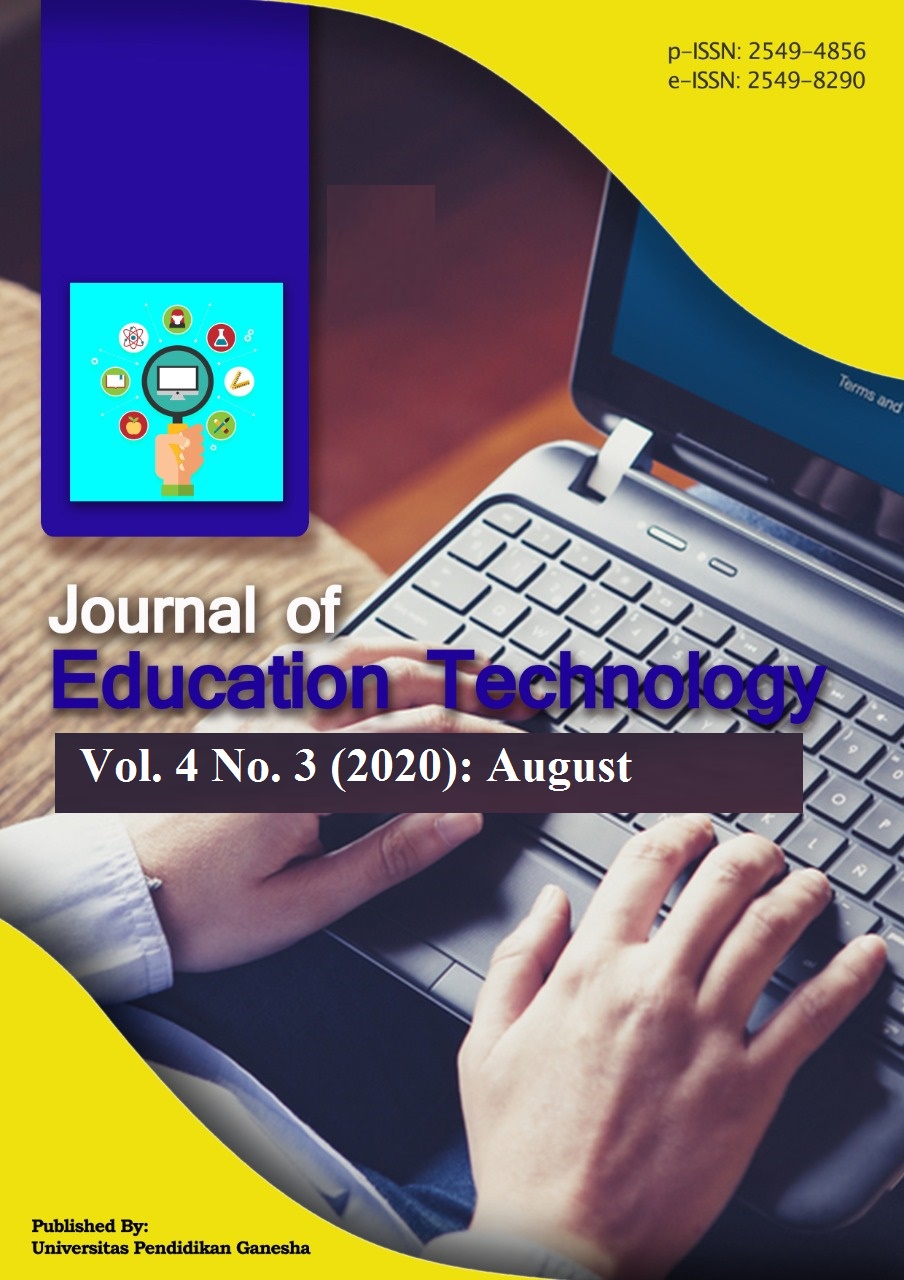The Development of Web-Based Learning Media on Western Bridal Make-Up Subject
DOI:
https://doi.org/10.23887/jet.v4i3.27895Keywords:
Web media, product feasibility, media development processAbstract
Internet-based educational facilities can be used as a means of delivering learning that relies on practical aspects and is easily accessible anywhere and anytime. In addition, this learning media enables distance learning or the delivery of information between lecturers and students. Western Bridal Make Up is a compulsory subject in an education program. This study aims to a) develop web-based learning media products on database materials for the Department of Makeup and Beauty Education at Universitas Negeri Padang through the process of developing media, b) obtain information about the feasibility of web-based learning media products on database materials used as support in database learning in the Department of Makeup and Beauty Education, Universitas Negeri Padang.This research uses alpha testing method (alpha testing). The research subjects in alpha testing were 2 media experts and 2 material experts, while the research subjects in beta testing were 20 students majoring in Makeup and Beauty Education, Padang State University. Data obtained by using test instruments to test the effectiveness and non-test instruments to test the validity and practicality in the research process. Based on the results of the developed learning media produces valid media in terms of media (design) with a value of 0.918 and valid from the material side with a value of 0.875 by media experts and material experts and from the practical side of the media developed has a practical level of practicality with a percentage of 95%, from the beta test obtained 100% very feasible. The implications of the application of this media can increase the use of instructional media as teaching material that is independent, mobile, and interactive by lecturers, thus helping lecturers in delivering learning material.
References
Afandi, J. (2017). Pengembangan perangkat pembelajaran matematika dengan pendekatan kontekstual budaya Lombok. Jurnal Tadris Matematika, 10(1), 1–17. https://doi.org/https://doi.org/10.20414/betajtm.v10i1.83
Branch, B. (2009). Instructional Design: The ADDIE Approach. Library of Congress.
Dani, A. A., Hikmawati, A., & Fathan, F. (2019). Implementasi digital assurance dalam peningkatan mutu pendidikan di sastra Inggris IAIN Surakarta. Jurnal Penjaminan Mutu, 5(1), 1. https://doi.org/10.25078/jpm.v5i1.721
Divayana, D. G. H., Suyasa, P. W. A., & Sugihartini, N. (2016). Pengembangan media pembelajaran berbasis web untuk matakuliah kurikulum dan pengajaran di jurusan pendidikan teknik informatika Universitas Pendidikan Ganesha. Jurnal Nasional Pendidikan Teknik Informatika (JANAPATI), 5(3), 149. https://doi.org/10.23887/janapati.v5i3.9922
Fauzi, H. N., & Rosliyah, Y. (2020). Persepsi Pembelajar terhadap Media Kamus Tematik Berbasis Web bagi Pembelajar Kosakata bahasa Jepang Tingkat Dasar. Jurnal Pendidikan Bahasa Jepang, 8(1), 25–32. https://doi.org/https://doi.org/10.15294/chie.v8i1.35752
Firmansyah, R., & Saidah, I. (2016). Perancangan web based learning sebagai media pembelajaran berbasis ICT. Informatika, 3(September), 176–182. https://doi.org/https://doi.org/10.31311/ji.v3i2.834
Gede, I. D., Raditya, N., Luh, N., & Widhiyani, S. (2018). Pengaruh budaya organisasi, dukungan manajemen puncak , dan pemanfaatan teknologi informasi pada kinerja sistem informasi akuntansi. E-Jurnal Akuntansi, 24, 845–870. https://doi.org/https://doi.org/10.24843/EJA.2018.v24.i02.p02
Harimurti, R. M. A., & Sutanto, Y. (2014). Pengembangan Aplikasi E-Business Untuk Manajemen Penjualan Menggunakan Sms Gateway Berbasis Web. Jurnal Penelitian Pos Dan Informatika, 4(1), 37–51. https://doi.org/http://dx.doi.org/10.17933/jppi.2014.040104
Hignasari, L. V., & Mardiki, S. (2020). Pengembangan E-Learning Dengan Metode Self-Assessment Untuk Meningkatkan Hasil Belajar Matematika Mahasiswa Universitas Mahendradatta. Jurnal Kependidikan: Jurnal Hasil Penelitian Dan Kajian Kepustakaan Di Bidang Pendidikan, Pengajaran Dan Pembelajaran, 6(2), 206–219. https://doi.org/https://doi.org/10.33394/jk.v6i2.2476
Nugroho, A. (2012). Pengembangan model pembelajaran jarak jauh berbasis web. Jurnal Transformatika, 9(2), 72. https://doi.org/10.26623/transformatika.v9i2.60
Priyambodo, E., Wiyarsi, A., & Sari, R. L. P. (2012). Pengaruh media pembelajaran interaktif berbasis web terhadap motivasi belajar mahasiswa. Jurnal Kependidikan Penelitian Inovasi Pembelajaran, 42(2), 99–109. https://doi.org/10.21831/jk.v42i2.2236
Qondias, D., Anu, E. L., & Niftalia, I. (2016). Pengembangan media pembelajaran tematik berbasis mind maping SD kabupaten Ngada Flores. JPI (Jurnal Pendidikan Indonesia), 5(2), 176. https://doi.org/10.23887/jpi-undiksha.v5i2.8590
Rahayu, T., Mayasari, T., & Huriawati, F. (2019). Pengembangan media website hybrid learning berbasis kemampuan literasi digital dalam pembelajaran fisika. Jurnal Pendidikan Fisika, 7(1), 130. https://doi.org/10.24127/jpf.v7i1.1567
Sari, H. V., & Suswanto, H. (2017). Pengembangan Media Pembelajaran Berbasis Web Untuk Mengukur Hasil Belajar Siswa Pada Mata Pelajaran Komputer Jaringan Dasar Program Keahlian Teknik Komputer Dan Jaringan. Jurnal Pendidikan: Teori, Penelitian, Dan Pengembangan, 2(7), 1008–1016. https://doi.org/https://doi.org/10.17977/jptpp.v2i7.9734
Susanti, B. H. (2019). Penggunaan Media Online Dalam Proyek Pembuatan Bahan Ajar Berbasis Web Pada Mata Kuliah Zoologi Vertebrata. Edusains, 11(01), 22–28. https://doi.org/https://doi.org/10.15408/es.v11i1.7728
Yayang, E., & Eldarni, E. (2019). Pengembangan e-modul berbasis web dengan menggunakan aplikasi moodle pada mata kuliah pengelolaan perpustakaan. Edutech, 18(1), 25. https://doi.org/10.17509/e.v18i1.14113
Yayuk, S., & Sugiyono, S. (2019). Pengaruh kepemimpinan kepala sekolah dan biaya pendidikan terhadap kualitas proses belajar mengajar dan dampaknya dengan kompetensi lulusan SMK di kabupaten Gunungkidul. Jurnal Akuntabilitas Manajemen Pendidikan, 7(1), 84–96. https://doi.org/10.21831/amp.v7i1.23758
Downloads
Published
How to Cite
Issue
Section
License
Authors who publish with the Journal of Education Technology agree to the following terms:
- Authors retain copyright and grant the journal the right of first publication with the work simultaneously licensed under a Creative Commons Attribution License (CC BY-SA 4.0) that allows others to share the work with an acknowledgment of the work's authorship and initial publication in this journal.
- Authors are able to enter into separate, additional contractual arrangements for the non-exclusive distribution of the journal's published version of the work (e.g., post it to an institutional repository or publish it in a book), with an acknowledgment of its initial publication in this journal.
- Authors are permitted and encouraged to post their work online (e.g., in institutional repositories or on their website) prior to and during the submission process, as it can lead to productive exchanges, as well as earlier and greater citation of published work. (See The Effect of Open Access)
















